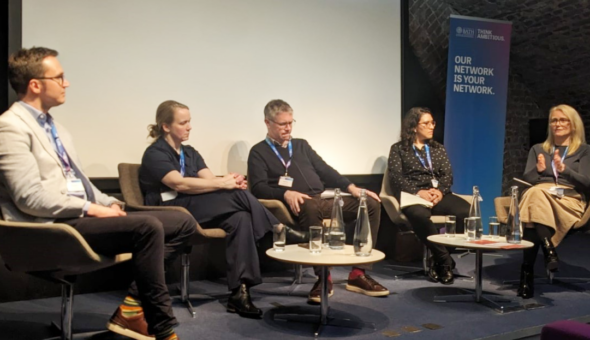All enterprises must balance consciously or unconsciously economic, environmental and social goals. In this piece, Dimo Dimov and Henrietta Sherwin discuss why social enterprise matters and explain how a research programme at the University of Bath is supporting the development of social enterprises.
Economic opportunities rest on an invisible social and environmental fabric – the unbridled, singular pursuit of purely economic goals can tear the very ground that gives rise to them. We are free to pursue our own interests only because our freedom has been willed by those who collectively make up the society in which we operate. Ensuring the freedom and prosperity of others is therefore the most sustainable form of value creation.
The geometry of economics
The pyramid is the most stable shape, offering the maximum height for a given volume. Pyramids naturally occur in nature and, not surprisingly, also in the organization of society and economic activity. The higher they need to be built, the wider their base needs to be. Higher and higher economic, scientific or sports achievements thus rest on an ever-widening base of human enrichment.
There is a clear pyramid in economic activity. Almost 100% of all enterprises are Micro-, Small and Medium-sized Enterprises (MSMEs), employing fewer than 250 people and collectively accounting for 60% of all employment. The heavy top of large enterprises (0.1%) employing 250+ people is sustained by the wide base of solo enterprises (76%) that do not employ anyone other than the owner; micro enterprises (19%) employing fewer than 10 people; and small and medium enterprises (4.9%), employing 10-250 people. The picture is similar in the EU28 overall – MSMEs account for 99.8% of all enterprises.
As the forces of globalization and technology make the top of the pyramid more mobile and volatile, the base becomes an ever more important custodian of the social fabric. MSMEs are the first responders to societal needs and provide the safety net for inclusiveness. They tend to employ a larger share of the vulnerable sectors of the workforce, such as women, youth, and people from poorer households. They might even be the only source of employment in rural areas.
Social enterprise and innovation
As their very name suggests, social enterprises embody the tension between the economic and the social. They aim to bridge the widening gulf between non-social enterprises – those for whom the impact on society is a mere ‘externality’ - and social non-enterprises, namely the organizations operating in the third sector.
“There is increasing pressure on charities and voluntary organisations to deliver more services to vulnerable and disadvantaged people, but there is less and less funding available. We hope that developing a social enterprise will enable us to carry on with our mission as a charity…whilst making a profit through a business with a social purpose.”
Stacey Pottinger, Wansdyke Play Association
Social enterprise has become a gravitational space for the two ends of the continuum. There are those driven by economic thinking who seek to create social impact, and conversely those driven by a social mission seeking to create a business engine. Ensuring the viability of social enterprise thus depends on bringing together diverse stakeholders and developing the requisite skills for balancing social mission and business performance.
The Social Enterprise and Innovation Programme (SEIP), funded by the European Regional Development Fund, seeks to fulfil that need. Led by the University of Bath and working alongside the Bath SETSquared Innovation Centre, the School for Social Entrepreneurs, VOSCUR in Bristol and the South Gloucestershire Centre for Voluntary Service, the programme reaches out to the various communities in the West of England to find seedlings of social enterprise.
“We realised that you can have an impact by doing volunteering, but you can have a greater impact if you create a platform to allow others to do so too. Yes I can do something every single weekend, but I'd rather do something that can help 1000s of people to volunteer instead.”
Everest Ekong, Food Drop
It provides advice and upskilling support to aspiring social entrepreneurs, and mentoring and development support for newly formed enterprises. One of the key objectives is to engage with aspiring entrepreneurs in all parts of the community – and particularly to empower those individuals that might consider this kind of support previously ‘out of reach’. Ultimately, the programme aims to support over 300 prospective social entrepreneurs.
Already, the programme has already helped a range of start-up enterprises. These include Food Drop, which redistributes excess food to the community, Wansdyke Play Association (WPA), which works with local communities and organisations to develop and deliver free community play services, and Visible Thought, which is developing a product to help young children understand letters and sounds.
“I know from my experience that very often good ideas happen when problems in everyday life need to be solved. The most important ingredient to any social enterprise is clarity of purpose - why is the enterprise so important to yourself and to society?”
Catherine Van de Steen, Visible Thought
Business development follows its own “time pyramid” of inspiration, ideation, incubation, and acceleration, with smaller and smaller sets of efforts gaining traction over time. In other words, not every idea will turn into a great opportunity, but a great opportunity can originate from anywhere. The challenge here, and one we hope to meet through SEIP, is to keep the base of inspiration and ideation as wide as possible, looking to create entrepreneurial sparks in all parts of society and particularly those with most pressing social problems.
Quotes are taken from SEIP case studies. There are two programmes of business support available - startup courses for new entrepreneurs, and business coaching for growing enterprises. Applications are now open for both programmes and there is a rolling schedule of workshops. More information can be found on the website.
Header image by rawpixel
Respond



